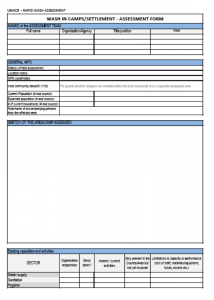 |
UNHCR WASH Rapid Assessment Forms (UNHCR, 2015)These rapid (emergency) assessment tools can be used to help assess water supply, excreta management, solid waste management, hygiene and disease vector control conditions in the following refugee settings: These rapid (emergency) assessment tools can be used to help assess water supply, excreta management, solid waste management, hygiene and disease vector control conditions in the following refugee settings: Camps; Settlements; Transit Centres; Schools; Health Centres and Urban Settlements. It also contains references to UNHCR’s WASH indicators and recommendations for data collection.
|
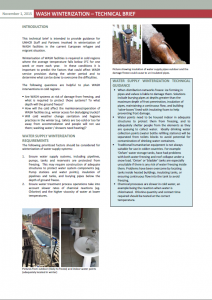 |
WASH Winterization Technical Brief (UNHCR, 2015)This technical brief is intended to provide guidance for UNHCR staff and Partners involved in winterization of WASH facilities in the current European refugee and migrant situation.
|
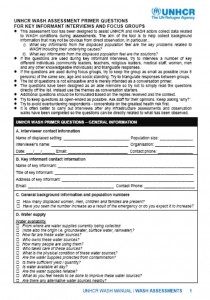 |
F-900/2015a UNHCR WASH Assessment Primer Questions (UNHCR, 2015)These WASH related primer questions have been designed to assist UNHCR and WASH actors collect data from key informants and focus groups during WASH assessments. The list of questions is not exhaustive and is merely intended as a conversation primer (aide memoire).
|
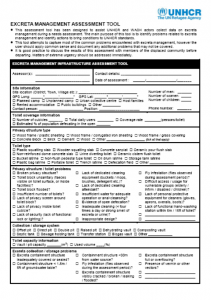 |
F-901/2015a UNHCR Excreta Management Assessment Tool (UNHCR, 2015)This assessment tool has been designed to assist UNHCR and WASH actors collect data on excreta management during a needs assessment. The main purpose of this tool is to identify problems related to excreta management and identify actions to bring conditions to UNHCR standards.
|
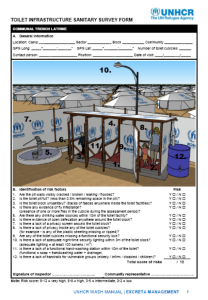 |
F-400/2015a Toilet Infrastructure Sanitary Survey Form (UNHCR, 2015)This sanitary survey form can be used to monitor and evaluate the condition of communal and public toilet blocks in a refugee setting. The main purpose of this tool is to rapidly identify public health and protection related risks. The tool can also be used in the medium term to monitor trends in the condition of toilet infrastructure.
|
 English
English